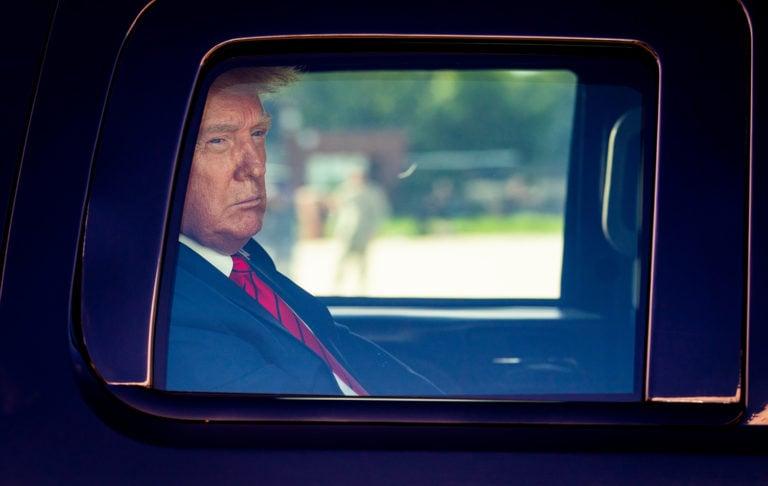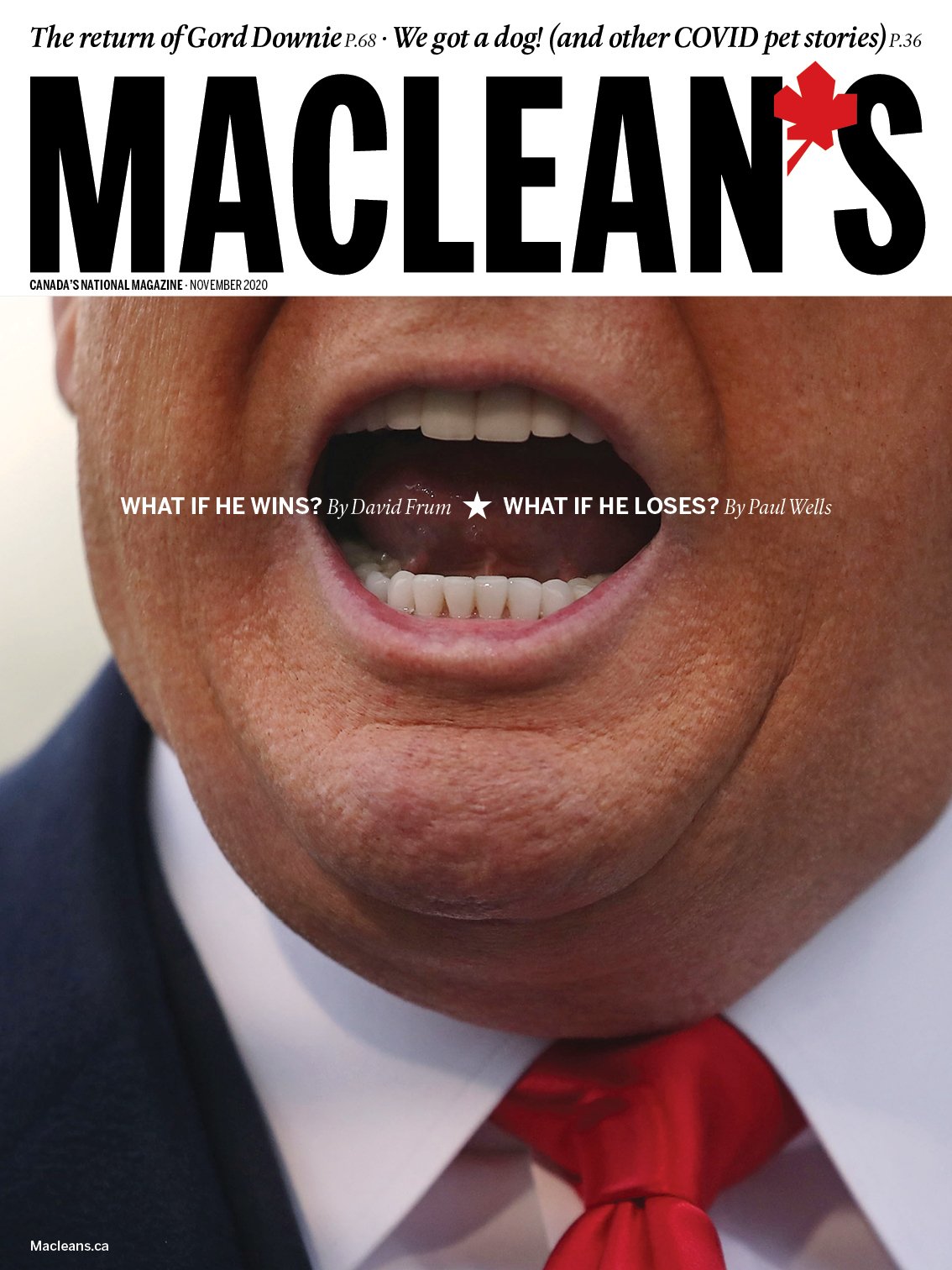What if Donald Trump wins again?
David Frum: First-term Trump was lazy, gullible, ignorant, vain and crooked. Second-term Trump would be worse.

If Trump can limit his Electoral College losses in the fall election, he can still eke out a win (Doug Mills/The New York Times/Redux)
Share
What if he wins? The first thing to understand about that great “what if”—from which so many other grim “what ifs” would follow—is what in the real world a so-called Donald Trump “win” would look like.
If everyone eligible to vote is allowed to vote, if every vote legally cast is counted—then Trump is doomed. His only hope is to find some way to stop the voting, stop the count, and then rely on the weird mechanics of the U.S. Electoral College to save him, against the people’s vote.
Barton Gellman reported in the Atlantic in September that the Trump team is working with officials in Republican-held states to set aside vote counts altogether—and instead authorize state legislatures to choose the state’s electors. If this scheme proves unfeasible, the Trump team has in mind a series of smaller finagles: arbitrarily stopping vote counts prematurely, rejecting—or outright seizing—mailed ballots, and many other forms of chicanery not seen in U.S. politics since the aftermath of the Civil War.
Here’s the core math to remember on the way to a Trump “win.”
PAUL WELLS: What if Donald Trump loses?
It’s a good estimate that somewhere close to 145 million Americans will vote in 2020, up from 133 million in 2016. The average of all the major national opinion polls suggests that this vote will break 50.3 per cent for Biden, 43.5 per cent for Trump; a margin of 10 million votes for Biden.
LIVE: Watch the 2020 election results roll in
But in a presidential election, the crucial votes are cast not by the people, but by the states, through the Electoral College. In 2016, Trump won 2.9 million fewer votes than Hillary Clinton, yet he won 306 electoral votes to Hillary Clinton’s 232. If in 2020 Trump can limit his Electoral College losses to his very most threatened states—Michigan and Arizona—he can still eke out a 279 to 259 win. (Trump also got a single electoral vote from Maine in 2016. If he loses that, too, he can still squeak to victory, or 278 to 260.)

For all the talk about the solid Trump “base,” it’s important to remember that Trump has been the least popular first-term president in the history of opinion polling, the only first-term president never to reach 50 per cent approval in any reputable poll. Every single day of the Trump presidency since his inauguration in 2017, a documented majority of the American people have disapproved of his administration.
So, the answer to the “what if Trump wins” question needs a little clarifying. Before we reach the effect of a Trump second term on the domestic and foreign policy of the United States, we need to consider how Trump gets from here to there. In real life, the question “what if Trump wins” really means:
What if Donald Trump claims a second term despite another rejection by the majority of American voters?
A Trump “win” will open the question: does voting work? If the American people cannot get rid of a rejected president by casting millions more votes against him than votes for him—how do they get rid of him?
If Trump not only loses the popular vote, but loses that vote in ways that look unfair—stopping the count, junking mailed ballots, forcing voters in minority neighbourhoods to wait in huge lines while voters in wealthier neighbourhoods wait in short ones—what then? The only way a Trump re-election can be achieved is by setting aside normal expectations of how democracy should work. What happens then? Will politics move into the streets? Since the killing of George Floyd by a Minneapolis police officer in May 2020, American cities have been wracked by protests and disturbances on a scale not seen since the 1960s. Do bigger and more turbulent protests follow in 2021?
[contextly_sidebar id=”oj5pfN1iufhdJ5ced9udnIlyY1SJkXci”]
A Trump second term will probably not look like the mostly quiet first three years of the Trump first term. A Trump re-election portends severe political instability for the United States. If Democrats take the Senate in 2020 or in 2022, will there be more impeachment contests, not only of Trump himself, but of despised Trump cabinet appointees like Attorney General Bill Barr? And what happens to the Supreme Court nomination that a re-elected Trump will try to cram through over the objection of the majority of U.S. voters? Will doubts about Trump’s legitimacy spread to other parts of the U.S. political and constitutional system?
And if so, what happens next?
What if Donald Trump tries to force his agenda after a second popular-vote loss?
Republicans face a tough Senate map in 2020. The Senate seats on the ballot in 2022 look even less hospitable to a Trump-led Republican Party. Odds are high, then, that Trump will face not one but two hostile chambers of Congress in a second term.
Those two hostile chambers will show a second minority-elected Trump presidency scant deference. They will see Trump as an illegitimate president, corrupt and compromised by foreign powers, somebody who gamed a broken system hopelessly biased against the American majority.
Trump will have no leverage, no ability to persuade Congress, no ability to reach over the head of Congress to mobilize the American people who will have just repudiated him. His only powers will be those that a president can use unilaterally.
Which leads to the third “what if”:
What if Trump’s scandals and crimes catch up with him in a second term?
In July 2020, the U.S. Supreme Court gave Trump the gift of time. Congress and New York state prosecutors had subpoenaed Trump’s bankers and accountants for financial records. Precedents dating back to the 1880s clearly favoured Congress. But the court found an escape hatch that postponed release of the documents until after the November election.
What has already been seen of Trump’s financial history has been scandalous enough. Evidence of tax fraud, of insurance fraud, of bank fraud, of charity fraud, of money-laundering, of business deals with foreign criminals has all come to light. Should Congress and state prosecutors get hold of more complete records, Trump may face civil and criminal liability on a scale more like a crime boss than a president of the United States.
Yet Trump will be president and will have tools to protect himself: especially the power to pardon. Trump can incentivize and reward silence by witnesses against him. He commuted the sentence of Roger Stone, his go-between to Julian Assange and WikiLeaks during the 2016 campaign. He could pardon Paul Manafort, Steve Bannon, Ghislaine Maxwell and other Trump associates accused or convicted of crimes that might implicate Trump. He could pardon his children. He could test the limits of law and try to pardon himself.
A second Trump term will see never-ending battles over a president’s power to immunize himself from accusations of crime. It will be Gotham City with the villains in charge.
So, the fourth “what if”:
What if Trump tries to lead U.S. alliances and partnerships around the world despite his illegitimacy at home?
Former secretary of defense James Mattis often says that the United States has two powers: the power of intimidation and the power of inspiration.
In a second Trump term, America’s powers of inspiration will dwindle. America under Trump looks authoritarian, corrupt and incompetent. Its performance during the COVID-19 pandemic was worse than incompetent. The U.S. president seemed motivated by crazy fantasies and infantile egotism as hundreds of thousands of Americans sickened and died unnecessarily.
The rhetoric of democracy will sound derisive in the mouth of an administration put in office by a favoured minority; the language of human rights will command little respect when the American president himself calls it “beautiful” when U.S. police turn their weapons on reporters doing their jobs.
Trump has made clear his vastly greater comfort with and sympathy for authoritarian leaders than democratic allies. Public opinion in the democratic allies has turned sharply against Trump and the United States.
And all this alienation of democratic friends coincides with a marked decline in America’s powers of intimidation.
During the financial crisis of 2008-2009, the U.S. economy was triple the size of China’s. Over the past decade, China has closed much of that gap: the U.S. economy is now only 50 per cent larger than China’s. On the present trajectory, China should equal the U.S. in the next decade or so.
Trump’s big idea as president was to preserve the U.S. lead over China. His administration adopted three big policies to achieve that end: a) a big corporate tax cut to boost U.S. growth; b) tariffs and other anti-trade measures to harm Chinese growth; and c) a big increase in military spending to deter Chinese aggression.
The big tax cut failed to deliver results. It went into effect at the end of 2017. The U.S. economy grew by 2.9 per cent in 2018 and 2.3 per cent in 2019—pleasant but unremarkable, and always short of Trump’s promise of four or even five per cent. There was not a single quarter under Trump when growth caught up to the best quarters under Barack Obama, in 2009, 2011 and 2014.
The trade war with China backfired on the United States. Chinese growth did slow in 2018 and 2019—but remained double that of the U.S. Meanwhile, American anti-trade measures harmed the U.S. farm economy and were the main reason for the slowdown in 2019 as compared to 2018.
As for Trump’s military buildup—$100 billion more in the current year than Obama’s last year—it seems to have had no effect at all. Ships and planes cannot protect democratic demonstrators in Hong Kong, or pressure China to crack down on North Korea, or stop Chinese cyberattacks on U.S. hospitals, or match China’s aid to resource-rich African countries. The two countries are just playing different games. When the United States accumulates weapons to win the game China is not playing, it does not prevent China from winning the game China is playing.
Which raises another terrifying “what if”:
What if there are more and worse crises ahead?
During the COVID outbreak, Donald Trump proved himself a dangerously poor crisis manager. He refused to plan for bad contingencies. He disregarded unwanted information. He interpreted all news through his own ego. He trusted crank information that promised no-work miracles over the advice of experts and scientists. He squandered his credibility by blatantly lying. He could never summon an iota of care or concern for anyone beside himself.
Luckily for Trump, he enjoyed a comparatively easy ride through his first three years in office. Except for natural disasters, he faced only self-created crises until coronavirus struck.
That luck is unlikely to hold in a second term.
READ MORE: The American Dream has moved to Canada
There may be more and worse natural disasters, like the hurricane that struck Puerto Rico in 2017 and the wildfires that ravaged the Pacific coast this summer. The recovery from coronavirus may be slower and more painful than hoped. The massive government debt piled up by Trump in his first four years—the heaviest load since the Second World War—may spike interest rates. China and India may fight, North Korea may fire rockets at Japan: your imagination is the only limit here. And Trump will be Trump, only worse. First-term Trump was lazy, gullible, vain, ignorant and crooked. Second-term Trump will be all those things, but also exposed to the whole world as lacking any clout with Congress, any authority in the country. Trump will tweet, people will get mad, but the president will have lost his ability to make things happen. When it counts most for Americans and the world, there will be effectively no U.S. president at all.
Yet as absent as he is, Trump still commands the loyalty of a ferocious minority who regard him as their champion against a threatening world. If he can hold the presidency for four more years, he can hold them. Which brings us to the last ominous “what if”:
What if Trump remakes the Republican Party as a Trump party for years to come?
The Republicans under Trump have become a post-democratic party. They have ceased to compete for votes. They instead compete to prevent voting. If they lose in 2020, they may accept that this project has failed.
But if Trump wins the Electoral College again in 2020, Republicans will collect the rewards of power without earning them the democratic way. A sinister new project will have delivered proof of concept. When something works, it survives. It spreads.

Over the long term, it is conservative Americans who have the most to gain if Trump loses. The discrediting of Trump offers their only path back to democratic viability. Republicans will not self-correct on their own—we have seen that over the past three-plus years. Too many have staked too much on him to turn away, unless painful defeat compels them to turn away. If Trump preserves a hold on power after November 2020, he will preserve his hold on his party—and continue his corruption of that party. Redeemed from Trump, they can renew themselves as a democratically competitive party of the centre-right. But only via defeat can they be redeemed.
The “what if” of a Trump win is a turn away from democratic competition to rule by the most ruthless, the most shameless, the most willing to prevail by any means necessary. That’s a turn to a very dark and dangerous future indeed. On Nov. 3, Americans will decide upon one direction or another—not only by how they vote, but by whether those votes are allowed to decide.
Ronald Reagan liked to call the United States a “shining city on a hill.” He was borrowing from the biblical Book of Matthew: “A city that is set on a hill cannot be hid.” In the Bible, that verse was not a boast. It was a warning. A city that is set on a hill cannot conceal its faults. Everybody can see. So it is with the United States. Their affairs matter to everyone. If their system succeeds, all free people everywhere are freer and safer. If their system fails, all free people everywhere suffer alongside them.
So what happens if Trump wins? The democratic idea loses. The world trade system loses. Collective security against authoritarian threats from Russia and China—that loses, too. Anybody of a mind to chuckle, point or condescend—after your first few moments of feeling superior—you lose, too. The whole world thrives or falters according to whether the United States thrives or falters. If Trump wins, that experiment falters—maybe not forever, because nothing is forever, but for a dangerously long time.
It’s not only American democracy on the U.S. ballot in November. It’s yours, too.
David Frum is an author and political commentator who served in the first administration of U.S. president George W. Bush. His latest book, Trumpocalypse: Restoring American Democracy, was published in May.
This article appears in print in the December 2020 issue of Maclean’s magazine with the headline, “What if Trump wins?” Subscribe to the monthly print magazine here.